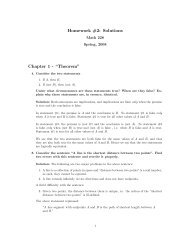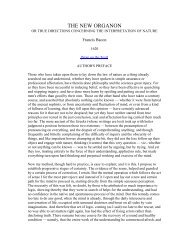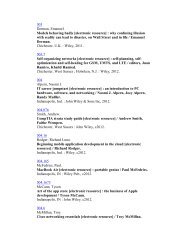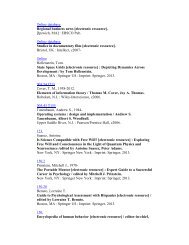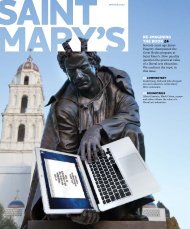- Page 1 and 2: Cryptology: An Historical Introduct
- Page 3 and 4: Contents List of Figures 8 1 Caesar
- Page 5 and 6: CONTENTS 5 9 Digraphic Ciphers 167
- Page 7 and 8: List of Figures 1.1 Saint Cyr Slide
- Page 9: Chapter 1 Caesar Ciphers There are
- Page 13 and 14: 1.1. SAINT CYR SLIDE 13 paper turne
- Page 15 and 16: 1.3. FREQUENCY ANALYSIS 15 PX PBEE
- Page 17 and 18: 1.3. FREQUENCY ANALYSIS 17 A bit mo
- Page 19 and 20: 1.3. FREQUENCY ANALYSIS 19 Examples
- Page 21 and 22: 1.4. LINQUIST’S METHOD 21 the cip
- Page 23 and 24: 1.7. EXERCISES 23 12. What is the m
- Page 25 and 26: 1.7. EXERCISES 25 (d) VTXLTKBTG LXV
- Page 27 and 28: 1.7. EXERCISES 27 (d) IKSUT JKIOT K
- Page 29 and 30: Chapter 2 Cryptologic Terms Cryptog
- Page 31 and 32: Chapter 3 The Introduction of Numbe
- Page 33 and 34: 3.1. THE REMAINDER OPERATOR 33 Exam
- Page 35 and 36: 3.1. THE REMAINDER OPERATOR 35 Perf
- Page 37 and 38: 3.1. THE REMAINDER OPERATOR 37 As a
- Page 39 and 40: 3.2. MODULAR ARITHMETIC 39 While %
- Page 41 and 42: 3.3. DECIMATION CIPHERS 41 previous
- Page 43 and 44: 3.4. DECIPHERING DECIMATION CIPHERS
- Page 45 and 46: 3.6. KOBLITZ’S KID-RSA AND PUBLIC
- Page 47 and 48: 3.6. KOBLITZ’S KID-RSA AND PUBLIC
- Page 49 and 50: 3.9. EXERCISES 49 8. How do we enci
- Page 51 and 52: 3.9. EXERCISES 51 (c) Encipher 54 4
- Page 53 and 54: 3.9. EXERCISES 53 (b) Encipher secr
- Page 55 and 56: Chapter 4 The Euclidean Algorithm I
- Page 57 and 58: 4.2. GCD’S AND THE EUCLIDEAN ALGO
- Page 59 and 60: 4.3. MULTIPLICATIVE INVERSES 59 (2)
- Page 61 and 62:
4.3. MULTIPLICATIVE INVERSES 61 (2)
- Page 63 and 64:
4.4. DECIPHERING DECIMATION AND LIN
- Page 65 and 66:
4.5. BREAKING DECIMATION AND LINEAR
- Page 67 and 68:
4.6. SUMMARY 67 To put it more blun
- Page 69 and 70:
4.8. EXERCISES 69 5. Here we work w
- Page 71 and 72:
Chapter 5 Monoalphabetic Ciphers He
- Page 73 and 74:
5.2. KEYWORD MIXED CIPHERS 73 Examp
- Page 75 and 76:
5.4. INTERRUPTED KEYWORD CIPHERS 75
- Page 77 and 78:
5.6. BASIC LETTER CHARACTERISTICS 7
- Page 79 and 80:
5.7. ARISTOCRATS 79 the 69971 or 42
- Page 81 and 82:
5.9. TOPICS AND TECHNIQUES 81 5.9 T
- Page 83 and 84:
5.10. EXERCISES 83 (h) DYVTP KKIQ.
- Page 85 and 86:
5.10. EXERCISES 85 13. Ciphers in w
- Page 87 and 88:
5.10. EXERCISES 87 17. General Pier
- Page 89 and 90:
Chapter 6 Decrypting Monoalphabetic
- Page 91 and 92:
6.2. DECRYPTING MONOALPHABETIC CIPH
- Page 93 and 94:
6.2. DECRYPTING MONOALPHABETIC CIPH
- Page 95 and 96:
6.2. DECRYPTING MONOALPHABETIC CIPH
- Page 97 and 98:
6.3. SUKHOTIN’S METHOD FOR FINDIN
- Page 99 and 100:
6.4. FINAL MONOALPHABETIC TRICKS 99
- Page 101 and 102:
6.5. SUMMARY 101 our ciphertext muc
- Page 103 and 104:
6.7. EXERCISES 103 Frequency count:
- Page 105 and 106:
6.7. EXERCISES 105 53++!305))6*;482
- Page 107 and 108:
6.7. EXERCISES 107 93 93 82 48 39 6
- Page 109 and 110:
Chapter 7 Vigenère Ciphers It was
- Page 111 and 112:
7.2. TRITHEMIUS, THE FATHER OF BIBL
- Page 113 and 114:
7.3. BELASO, THE UNKNOWN AND PORTA,
- Page 115 and 116:
7.4. VIGENÈRE CIPHERS 115 to encip
- Page 117 and 118:
7.6. HOW TO BREAK VIGENÈRE CIPHERS
- Page 119 and 120:
7.6. HOW TO BREAK VIGENÈRE CIPHERS
- Page 121 and 122:
7.7. THE KASISKI TEST 121 Kasiski
- Page 123 and 124:
7.8. SUMMARY 123 Repetition Start P
- Page 125 and 126:
7.10. EXERCISES 125 2. Little Miss
- Page 127 and 128:
7.10. EXERCISES 127 to Gen. E. K. S
- Page 129 and 130:
7.10. EXERCISES 129 MEJMY JKXCD LCN
- Page 131 and 132:
7.10. EXERCISES 131 22. (a) Use Kas
- Page 133 and 134:
7.10. EXERCISES 133 (a) Construct a
- Page 135 and 136:
Chapter 8 Polyalphabetic Ciphers Th
- Page 137 and 138:
8.1. COINCIDENCES 137 (being born o
- Page 139 and 140:
8.2. THE MEASURE OF ROUGHNESS 139 I
- Page 141 and 142:
8.2. THE MEASURE OF ROUGHNESS 141 P
- Page 143 and 144:
8.3. THE FRIEDMAN TEST 143 The Frie
- Page 145 and 146:
8.4. MULTIPLE ENCIPHERINGS 145 Bein
- Page 147 and 148:
8.4. MULTIPLE ENCIPHERINGS 147 Just
- Page 149 and 150:
8.5. VIGENÈRE’S AUTO KEY CIPHER
- Page 151 and 152:
8.5. VIGENÈRE’S AUTO KEY CIPHER
- Page 153 and 154:
8.6. PERFECT SECRECY 153 invent now
- Page 155 and 156:
8.8. TERMS AND TOPICS 155 multiple
- Page 157 and 158:
8.9. EXERCISES 157 6. As is this on
- Page 159 and 160:
8.9. EXERCISES 159 13. It has been
- Page 161 and 162:
8.9. EXERCISES 161 This is Equation
- Page 163 and 164:
8.9. EXERCISES 163 A: AB CDE FGH I
- Page 165 and 166:
8.9. EXERCISES 165 26. Decipher SVQ
- Page 167 and 168:
Chapter 9 Digraphic Ciphers Althoug
- Page 169 and 170:
9.1. POLYGRAPHIC CIPHERS 169 f a g
- Page 171 and 172:
9.2. HILL CIPHERS 171 th 2.96 es 1.
- Page 173 and 174:
9.2. HILL CIPHERS 173 We will be us
- Page 175 and 176:
9.3. RECOGNIZING AND BREAKING POLYG
- Page 177 and 178:
9.4. PLAYFAIR 177 Playfair Ciphers:
- Page 179 and 180:
9.5. SUMMARY 179 9.5 Summary Polygr
- Page 181 and 182:
9.7. EXERCISES 181 (b) The use of
- Page 183 and 184:
9.7. EXERCISES 183 10. Just as we c
- Page 185 and 186:
9.7. EXERCISES 185 (d) (For those(
- Page 187 and 188:
9.7. EXERCISES 187 The rules that W
- Page 189 and 190:
Chapter 10 Transposition Ciphers In
- Page 191 and 192:
10.3. TURNING GRILLES 191 1 2 3 7 4
- Page 193 and 194:
10.4. COLUMNAR TRANSPOSITION 193 co
- Page 195 and 196:
10.5. TRANSPOSITION VS. SUBSTITUTIO
- Page 197 and 198:
10.6. LETTER CONNECTIONS 197 F 2 G
- Page 199 and 200:
10.7. BREAKING THE COLUMNAR TRANSPO
- Page 201 and 202:
10.8. DOUBLE TRANSPOSITION 201 Sinc
- Page 203 and 204:
10.9. TRANSPOSITION DURING THE CIVI
- Page 205 and 206:
10.9. TRANSPOSITION DURING THE CIVI
- Page 207 and 208:
10.10. THE BATTLE OF THE CIVIL WAR
- Page 209 and 210:
10.13. EXERCISES 209 14. What is a
- Page 211 and 212:
10.13. EXERCISES 211 and the second
- Page 213 and 214:
10.13. EXERCISES 213 evening Adam h
- Page 215 and 216:
10.13. EXERCISES 215 Several codewo
- Page 217 and 218:
10.13. EXERCISES 217 4. (which is t
- Page 219 and 220:
Chapter 11 Knapsack Ciphers Merkle
- Page 221 and 222:
11.3. AN EASY KNAPSACK PROBLEM 221
- Page 223 and 224:
11.4. THE KNAPSACK CIPHER SYSTEM 22
- Page 225 and 226:
11.4. THE KNAPSACK CIPHER SYSTEM 22
- Page 227 and 228:
11.5. PUBLIC KEY CIPHER 227 Even wi
- Page 229 and 230:
11.8. EXERCISES 229 2. Given the we
- Page 231 and 232:
Chapter 12 RSA Take two large prime
- Page 233 and 234:
12.1. FERMAT’S THEOREM 233 Exampl
- Page 235 and 236:
12.3. COMPLICATION II: A SUBSTANTIA
- Page 237 and 238:
12.3. COMPLICATION II: A SUBSTANTIA
- Page 239 and 240:
12.5. COMPLICATION IV: THE LAST ONE
- Page 241 and 242:
12.6. PUTTING IT ALL TOGETHER 241 1
- Page 243 and 244:
12.8. RSA 243 The RSA Algorithm Set
- Page 245 and 246:
12.9. RSA AND PUBLIC KEYS 245 There
- Page 247 and 248:
12.10. HOW TO BREAK RSA 247 had to
- Page 249 and 250:
12.12. SUMMARY 249 cannot read the
- Page 251 and 252:
12.14. EXERCISES 251 6. What is a
- Page 253 and 254:
12.14. EXERCISES 253 Bob is going t
- Page 255 and 256:
Bibliography [Antonucci] Michael An
- Page 257:
BIBLIOGRAPHY 257 [Shamir] [SRA] A.





